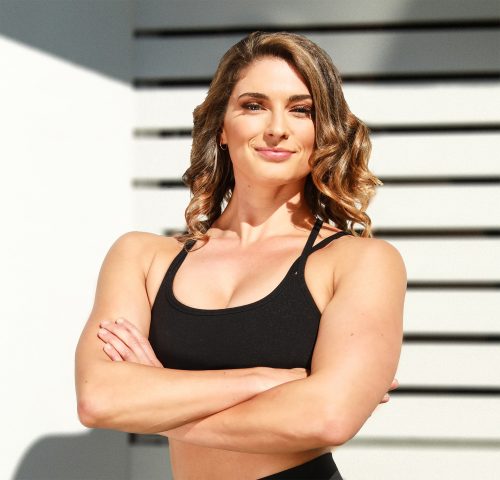
Caitlin Arnold is a vegan Accredited Sports Nutritionist, Strength & Conditioning coach and bodybuilder at Plant Forged Physique. Her passion is helping vegans achieve their health and fitness goals with evidence-based guidance and expertise.
While many people decide to go vegan due to the treatment of animals, there is an increasing number of people who are choosing a plant-based or vegan diet for the purpose of losing body fat and weight management.
And for relatively good reasons. Omnivores have the highest prevalence of being overweight and obese compared to people following a vegetarian, vegan, or semi-plant-based diet. A massive study with 103,455 men and 270,348 women between 1992 and 2000 found a positive association between total meat consumption and weight gain: an increase in 250 g/day of meat led to a 2kg gain after 5 years, even when adjusting for the calorie increase.

Weight loss studies into veganism
In observational studies, people with plant-based diets generally have lower body weights compared with omnivores. And there have been several studies that look into using plant-based diets as a strategy for weight loss.
A 2016 review of 12 clinical studies found significant weight loss among individuals assigned to a vegetarian diet: they lost an average of −2.02 kg more than the participants assigned a non-vegetarian diet. The review went further and found that vegan diets lost more weight than vegetarian diets: an average of −2.5 kg vs. −1.5 kg, respectively.
Why vegan diets work for weight loss
Data indicates that vegans consume less energy than omnivores. This is because there’s a higher prevalence of low calorie dense foods in a plant-based diet.
Calorie density refers to the number of calories compared to the weight of the food. For example – 100g of cheddar cheese has about 400 calories, while 100g of peeled carrots has about 30 calories.

Whole plant-foods contain mostly water and are high in fibre which gives them low calorie density compared to their volume. Eating these ‘low energy per bite’ foods helps give you that feeling of fullness and satisfaction while maintaining low caloric intake which can be helpful for weight management.
Essentially – you can eat the same volume of food or more on a vegan diet, but with less calories than a typical omnivorous diet.
When it comes to weight loss: is going vegan the answer?
In summary: Yes, but it depends.
Plant-based diets can be an effective way to lose weight. This is because they are typically lower in calories compared to an omnivore diet, and the fibre can help maintain fullness during dieting.
For some people, that’s a useful method to lose weight.
But the main thing you need to lose weight is an appropriately sized calorie deficit – i.e. you’re using more energy than you’re consuming from food. That isn’t exclusive to a vegan diet but could be easier to achieve via eating solely plant foods.
Along with fat loss, plant-based diets can improve dietary quality and are associated with reduced mortality, particularly from cardiovascular disease and cancer and may be especially beneficial for those with obesity, Type 2 diabetes, high blood pressure, lipid disorders, or heart disease.
A poorly constructed diet high in refined and processed foods, low in wholefoods, with poor micronutrient diversity, and high in calories is unlikely to create weight loss or provide additional health benefits – whether it is vegan or not.

In a nutshell, veganism has many benefits including weight loss when done correctly with a calorie deficit. Changing to a 100% plant-based diet can be a significant health and lifestyle change. So if you’re interested in pursuing this, we recommend doing your research (like reading Vegan Easy’s micronutrient mini-series or doing the free Vegan Easy Challenge) or getting professional support to make sure the transition is as smooth as possible.

